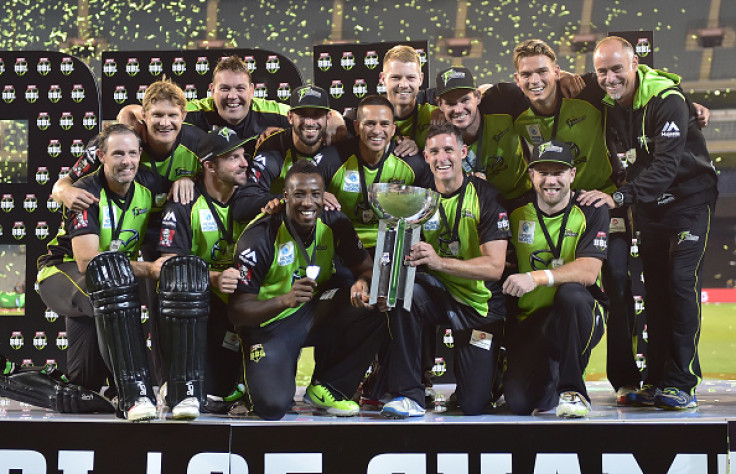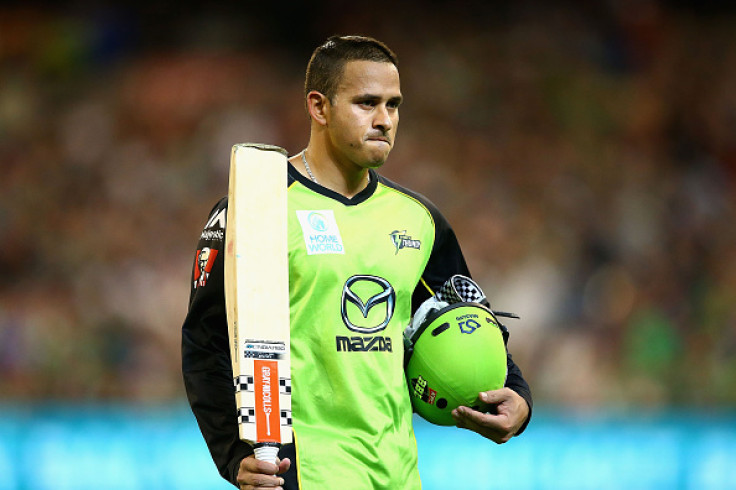How an analytics company from India helped Sydney Thunder win Big Bash League

Last, last, last and second-last. This is how Sydney Thunder were placed in the Big Bash League (BBL) since its inception in December 2011. The Sydney Showground Stadium outfit went without a win in the entire 2012/13 season. After finishing at the bottom of the table for the first three seasons, they managed to become the second-worst team in the fourth edition of BBL.
Before the start of this year's competition, two-time winners Perth Scorchers were favourites to win the tournament for the third consecutive year after making it to the final on all four occasions, prior to the one on 24 January. Simultaneously, Sydney Thunder were the laughing stock of BBL, considering their poor track record.
The team led by Michael Hussey, who played his last professional cricket on Australian soil in the final against Melbourne Stars, surprised fans who closely followed BBL. Usman Khawaja continued his terrific form into the final and his knock of 70 helped the Thunder defeat Melbourne Stars in the final by three wickets.
A proper strategy needed to be implemented to help Sydney Thunder make it to the knockout stage this year. And Impact Index, who were roped in as team consultants, played a part in helping the Sydney team clinch the BBL trophy at the Melbourne Cricket Ground on Sunday (24 January).
The role played by Impact Index was not brought to light until now. Jaideep Varma, the founder of Impact Index in an exclusive interview with IBTimes UK explained how they helped the team succeed. He said, "Impact Index is an analytics system used to determine the accurate worth of a player's performance, in a match, team and career context."
"It measures the impact of a player's performance in a specific match, entirely in the match context and relative to the other performances in the same match. A variety of other factors are measured in the above process, which have so far never been factored-in for measuring a cricketer's performance."

Impact Index is all about analysing the player's ability to deliver and identifying his role in the team. A batsman's ability to play under pressure throughout his career, or a bowler's propensity to break partnerships. Team strengths are also measured in Impact Index's system.
Given the manner in which Impact Index clearly measures character, it can be used for selecting players, composing teams and analysing the opposition as a complement to other conventional analytics.
Impact Index's chief analyst Soham Sarkhel explained how they have collected data of all the official T20 leagues with the help of their system, they draw results out of it in finding which player has been consistent with the bat or ball, who is capable of restricting the opposition based in the context of the game.
"We have a database for all the official T20 leagues in the world in which we have tracked the performance of each and every participating player," Sarkhel said.
Impact Index have collected data of all the official T20 leagues with the help of their system, they draw results out of it in finding which player has been consistent with the bat or ball, who is capable of restricting the opposition based in the context of the game.
"So, based on the constituent members of each squad in the BBL, we analyse a team's strengths and weaknesses. Based on those numbers, we then suggested different strategies against different teams."
"Along with the macro inputs, we also indulged in some microanalysis, where we targeted key opposition batsmen with their weaknesses."
Nikhil Narain, Impact Index's creative director further gives one of the insights on what they had advised Sydney Thunder to do during the course of the recently concluded season.
He stressed, "We suggested that Travis Head (Adelaide Strikers) should be fed outside the off-stump as he is a predominantly leg-side hitter and in both the games against Thunder, he perished trying to play on the off-side."
"Or take Brad Hodge's example, where we suggested that he should be playing more spin at the start of his innings. In both his innings against Thunder, he was tied down by the spinners and eventually succumbed to the pressure.
"Even in the final against Stars, we had suggested to bowl bouncers angling into Luke Wright's body, and he was eventually dismissed trying to fend an uncomfortable rising short-pitched delivery," Narain added.
Impact Index had also stressed on including Jacques Kallis and Aiden Blizzard in the final against the Melbourne-based outfit. In addition to this, they also advise on what would be the best option, should a team win the toss depending on the opposition's strength and weakness.
"We suggested that if Sydney Thunder wins the toss in the final against Melbourne Stars, then Thunder should chase as they had the highest Chasing Impact amongst all the teams in the tournament," Sarkhel explained.
"One of the biggest concerns before the start of the tournament was to select the proper batting order, given there were five genuine opening contenders in their top five- Jacques Kallis, Usman Khawaja, Michael Hussey, Shane Watson and Aiden Blizzard.
"We studied each batsman's impact in different positions and then came up with a strategic batting order."
Hussey's side made two changes to their squad and Kallis' opening run partnership of 86 with Khawaja and Blizzard's knock of 16 of seven deliveries down the order played vital roles in the end.
"In the final, we had suggested Thunder to open the innings with Kallis and not Watson (who opened in the previous game)," he added.
"Watson's susceptibility to in-swingers (he would have been facing two top class swing bowlers in Hilfenhaus and Worrall) doubled with Kallis' reduced impact as a non-opener helped us make that call."
"Much before the tournament, we had also suggested three possible player signings out of which one was Andre Russell - who was amongst the three highest impact players in the tournament. "We had also recommended picking Aiden Blizzard for the knockout stages of the tournament based on his previous big-match experience - which was justified by his contribution at the most crucial stage in the final."
Impact Index has on previous occasions predicted the semi-finalists of major ODI and T20 tournaments - both international and domestic. Their conversion rate of getting the final four teams has been impressive so far.
"We have covered 13 tournaments so far (including ODI and T20 tournaments), where we have got 38 out of the 52 semi-finalists right, which is a success rate of 73%," Narain said.
"Also, interestingly, no team which has been out of our projected top four have ever gone on to win a tournament. This, though, was our first foray into consultancy."
"Before the start of the BBL, our four predicted semi-finalists were: Perth Scorchers, Brisbane Heat, Melbourne Renegades and Sydney Thunder whereas we picked Melbourne Stars as our dark-horse."
"So, Thunder were anyways supposed to reach the knockout stages of the team. Interestingly, Thunder were the higher impact team going into their semi-final (Adelaide Strikers) as well as the final (Melbourne Stars). So, despite the passage they got in the knockout stages, they were not really the underdogs. They were the favourites."
When asked if they have received offers from any of the IPL outfit, Sarkhel said. "We are in touch with two IPL teams as of now [for becoming team consultants]."
He claimed Impact Index's strength during the team selection process, and with IPL auction set to take place on 6 February, franchises could use their expertise while bidding for players.
Sarkhel revealed, "Sydney Thunder had more or less selected their squad when we came on-board, so we couldn't help them much with player selections, which is actually Impact Index's forte as we can find out hidden talents in the T20 leagues around the world. So, we hope in the future that we can work on player selections in particular."
© Copyright IBTimes 2024. All rights reserved.






